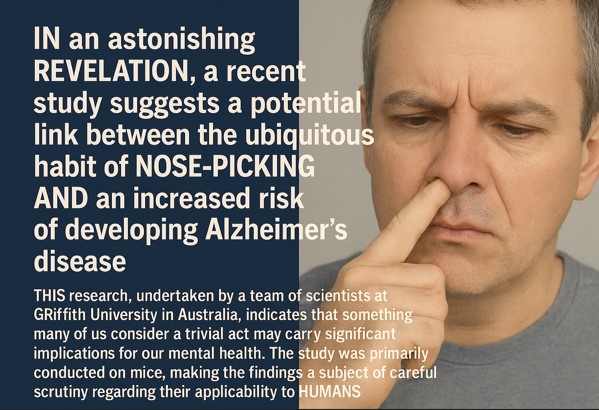Nose-Picking: Discovery Unveils Fascinating Connection Between a Common Habit and Dementia Risk
In an astonishing revelation, a recent study suggests a potential link between the ubiquitous habit of nose-picking and an increased risk of developing Alzheimer’s disease. This research, undertaken by a team of scientists at Griffith University in Australia, indicates that something many of us consider a trivial act may carry significant implications for our mental health. The study was primarily conducted on mice, making the findings a subject of careful scrutiny regarding their applicability to humans.
The investigation focuses on a bacterium known as Chlamydia pneumoniae. It is notable for its role in causing pneumonia and has been discovered in the brains of individuals affected by late-onset dementia. The researchers found that when the nasal tissues are damaged through habits such as nose-picking, it creates a pathway for this bacterium to travel to the brain, potentially triggering mechanisms related to Alzheimer’s.
Who Conducted the Study?
The research was led by neuroscientist James St John and his team at Griffith University. The study published in Scientific Reports highlights the need for further exploration into how our everyday actions could influence our brain health.
What Are the Findings?
While the implications of the study raise significant concerns, researchers warn that this link is not yet confirmed in human subjects. The current evidence stems from experimentation with mice, indicating that the Chlamydia pneumoniae bacteria can travel along the olfactory nerve into the brain when the nasal epithelium is injured or damaged. This journey may trigger a cascade of biological responses similar to those observed in early Alzheimer’s disease, indicating a possible correlation that merits further exploration.
Where and When Was This Study Conducted?
The study was conducted at Griffith University in Australia, with findings published in October 2022. The unique aspect of this research is its focus on how intranasal infections could significantly influence neurodegenerative conditions over time.
Why Is This Study Important?
Understanding the pathways that lead to Alzheimer’s disease is crucial, as the mechanism of its onset remains an ongoing scientific mystery. Alzheimer’s is the most common form of dementia, affecting millions globally, and current treatments only alleviate symptoms but do not provide a cure. Therefore, this research could pave the way for exploring novel preventive measures against the illness.
How Was the Research Conducted?
In the laboratory setting, the Griffith University researchers introduced Chlamydia pneumoniae to the nasal cavities of mice. They observed that the bacterium could rapidly travel to the brain within a span of 24 to 72 hours. This was alarming, as the damaged nasal epithelium exacerbated the spread of the bacteria, leading to increased production of amyloid-beta protein. Amyloid-beta is known for its role in the formation of plaques often observed in Alzheimer’s patients.
James St John emphasized the potential risks: “We’re the first to show that Chlamydia pneumoniae can go directly up the nose and into the brain where it can set off pathologies that look like Alzheimer’s disease,” he stated, urging the importance of further studies in humans to substantiate this pathway’s relevance.
The Underlying Mechanism of Nose-Picking and Alzheimer’s
As researchers delve deeper into the findings, it is critical to note that while nose-picking is a common behavior amongst nearly 90% of the population, it is often seen as an innocuous habit. However, the emerging evidence suggests it could carry hidden risks associated with damaging protective nasal tissues, making participants more susceptible to infections that may affect cognitive functioning.
These new insights may lead to the reevaluation of seemingly benign habits and highlight the importance of preventative health measures in our daily routines. It remains to be seen how this research will influence individual behaviors and health practices moving forward.
Understanding Alzheimer’s Disease: Contextualizing the Risk
Alzheimer’s disease is a progressive disorder characterized by cognitive decline, memory loss, and changes in behavior. Understanding the multitude of influences that can contribute to its development is essential for both scientists and the general public.
Current knowledge indicates that a variety of factors, including age, genetic disposition, and environmental exposures, can impact the likelihood of developing Alzheimer’s. As James St John notes, “While age is a significant risk factor once you reach 65 years, other elements, particularly environmental exposures, are equally vital.”
Amidst ongoing research, the discovery of bacteria’s potential role signifies a promising direction for tackling Alzheimer’s. A focus on preventive measures, such as improved hygiene practices and avoidance of damaging habits, could emerge as vital components in future Alzheimer’s research and education initiatives.
Moving Forward: The Call for Comprehensive Research
The research from Griffith University is only the beginning of unraveling the complex relationship between nose-picking and Alzheimer’s disease. As per the report by Times of India, the need for further studies encompassing human subjects is critical to discern whether these findings can be translated into actionable insights in real-world scenarios.
Until further evidence can confirm the link between this common habit and the risk of developing dementia, researchers recommend the public exercise caution by avoiding both nose-picking and plucking nose hairs, which can exacerbate potential risks.
This study serves as a reminder of the intricate connections between our daily behaviors and long-term health outcomes. Each new discovery in the realm of Alzheimer’s research adds a vital piece to the larger puzzle, bringing scientists a step closer to demystifying this pervasive disease and evolving strategies to combat it.
For further details on Alzheimer’s disease prevention, check out our articles on Alzheimer’s Prevention Strategies and recent breakthroughs in dementia research here.
As the scientific community continues to explore the factors associated with Alzheimer’s disease, it becomes increasingly important to engage in conversations about our health, habits, and the wider implications they may have on brain health.


